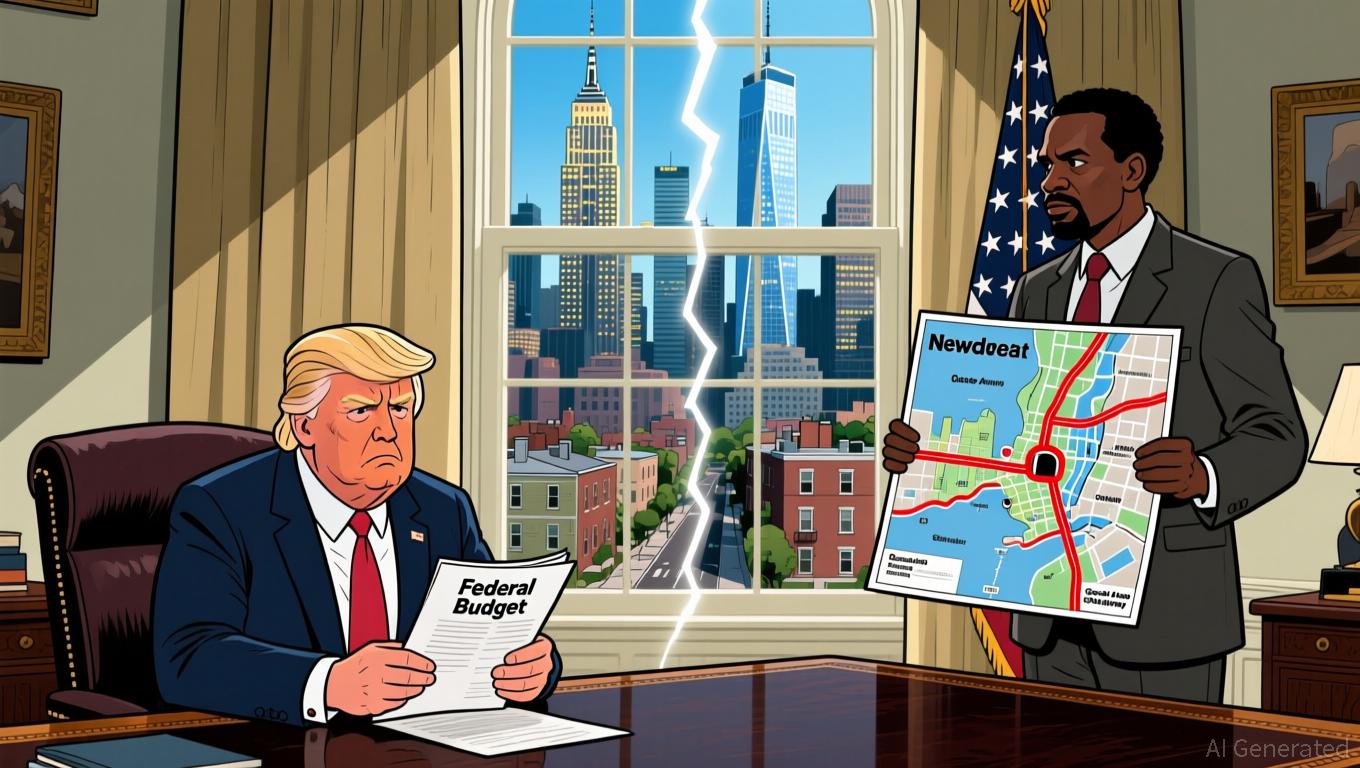Trump and Mamdani’s Bet on Affordability: Uniting Opposing Ideologies
- Trump and Mamdani's Nov. 21 meeting highlights clashing ideologies on affordability and governance, with New York's $1.286T economy at stake. - Both leaders share focus on cost-of-living crises but differ sharply on solutions, with Trump threatening federal funding cuts and Mamdani advocating rent freezes. - Experts see the dialogue as critical for redefining strained city-federal relations, emphasizing urban centers' role as economic engines. - Mamdani's corporate tax proposals clash with Trump's deregu
The November 21 discussion at the White House between President Donald Trump and New York’s incoming mayor, Zohran Mamdani, has become a flashpoint in national politics. Observers see the meeting as a crucial test for the relationship between city leadership and the federal government. Mamdani, a 34-year-old democratic socialist, and Trump, a 79-year-old Republican, have sharply contrasting approaches to economic issues, but both made the rising cost of living a central theme in their campaigns—a common concern that may shape their conversation
Mamdani’s election win has been met with strong opposition from Trump, who has repeatedly called him a “communist” and threatened to cut off federal support to New York City. The president has also suggested deploying military or immigration officials to the city, a threat Mamdani has dismissed as exaggerated. Speaking to the press before the meeting, Mamdani reaffirmed his focus on making the city more affordable, saying, “No one understands the burden of high living expenses better than New Yorkers,” and pledged to pursue policies that would help the city’s 8.5 million people

Mamdani’s agenda—which includes policies like freezing rents and providing universal childcare—has drawn harsh criticism from Trump, who sees these measures as a threat to market freedoms. Nevertheless, both leaders have found some alignment in their emphasis on affordability. Mamdani pointed out that one in ten Trump voters in New York ultimately backed his campaign, attracted by his promises to address the cost-of-living crisis
The broader impact on business interests is also considerable. Mamdani’s proposals to increase taxes on corporations and the wealthy reflect a growing critique of economic inequality, which some analysts, including an unnamed Bloomberg commentator, describe as a “reckoning” for industries reliant on capital. In contrast, Trump has promoted business-friendly policies such as deregulation and tariffs, which his critics say have contributed to inflation. This confrontation highlights a national debate over how to balance economic prosperity with social fairness.
As the meeting draws near, Mamdani must contend with Trump’s unpredictability while advocating for New York’s priorities. His team has stressed the importance of restoring federal funding, especially for major infrastructure projects like the Gateway tunnel and the Second Avenue Subway
More broadly, this meeting highlights the growing divide between progressive cities and a federal government focused on conservative economic strategies. With New York’s GDP approaching $1.286 trillion and its role as a global financial center on the line, the outcome could shape how cities and the federal government interact during Trump’s second term.
Disclaimer: The content of this article solely reflects the author's opinion and does not represent the platform in any capacity. This article is not intended to serve as a reference for making investment decisions.
You may also like
Bitcoin News Today: Bitcoin as Digital Gold, Ethereum as the Engine of Decentralized Finance: How Cryptocurrencies Are Carving Out Distinct Functions
- BlackRock executives highlight Bitcoin's shift toward "digital gold" as a long-term store of value, supported by institutional demand and fixed-supply models like Bitcoin Munari. - Ethereum's faster transaction velocity (3x BTC) reinforces its "digital oil" role, contrasting with Bitcoin's stable, passive accumulation strategy and macro-hedge appeal. - Regulatory clarity on stablecoins and blockchain transparency could deepen Bitcoin's institutional adoption while highlighting risks in altcoins like Aero

Stargate’s AI Strategy: Safeguarding the Nation or Raising Antitrust Concerns?
- Stargate, a $500B AI joint venture led by OpenAI, Oracle , and Nvidia , aims to consolidate computing power across seven gigawatt data centers in the U.S. and UAE. - Yale scholar Madhavi Singh warns the alliance violates antitrust laws by merging fierce competitors, risking cartel-like behavior and stifling innovation in chips and cloud services. - Critics argue Stargate eliminates competition in key AI sectors, while the Trump administration and lawmakers praise it as a strategic move to counter China,

Bitcoin Updates Today: Bitcoin Faces a Battle: DWF Issues Buy Alert Amid Market Turbulence
- DWF Labs buys Bitcoin at $84,000 amid 30%+ drop from $126,000 peak, signaling institutional confidence despite market turbulence. - U.S. market weakness highlighted by 21-day negative Coinbase premium (-0.0989%) and $3.79B ETF outflows, including $523M from BlackRock's IBIT . - Strategic buyers like Harvard (+250% IBIT holdings) and Japan's Metaplanet (¥15B allocation) contrast with $4B in realized Bitcoin losses and 35% drop in futures open interest. - Long-term bullish factors include U.S. Strategic Bi

Bitcoin News Today: "Institutional Embrace Helps Steady Bitcoin During Market Volatility"
- Bitcoin remains stable amid market volatility, with analyst Lyn Alden dismissing crash fears due to institutional adoption and macroeconomic factors. - Stablecoin reserves hit $72B, while Circle's USDC outpaces Tether and Solana secures $1B in institutional funding, signaling growing regulated crypto confidence. - Alden predicts $100K Bitcoin by 2026, attributing stability to extended cycles driven by macro demand rather than traditional halving patterns. - Diverging analyst views highlight risks, but Al
